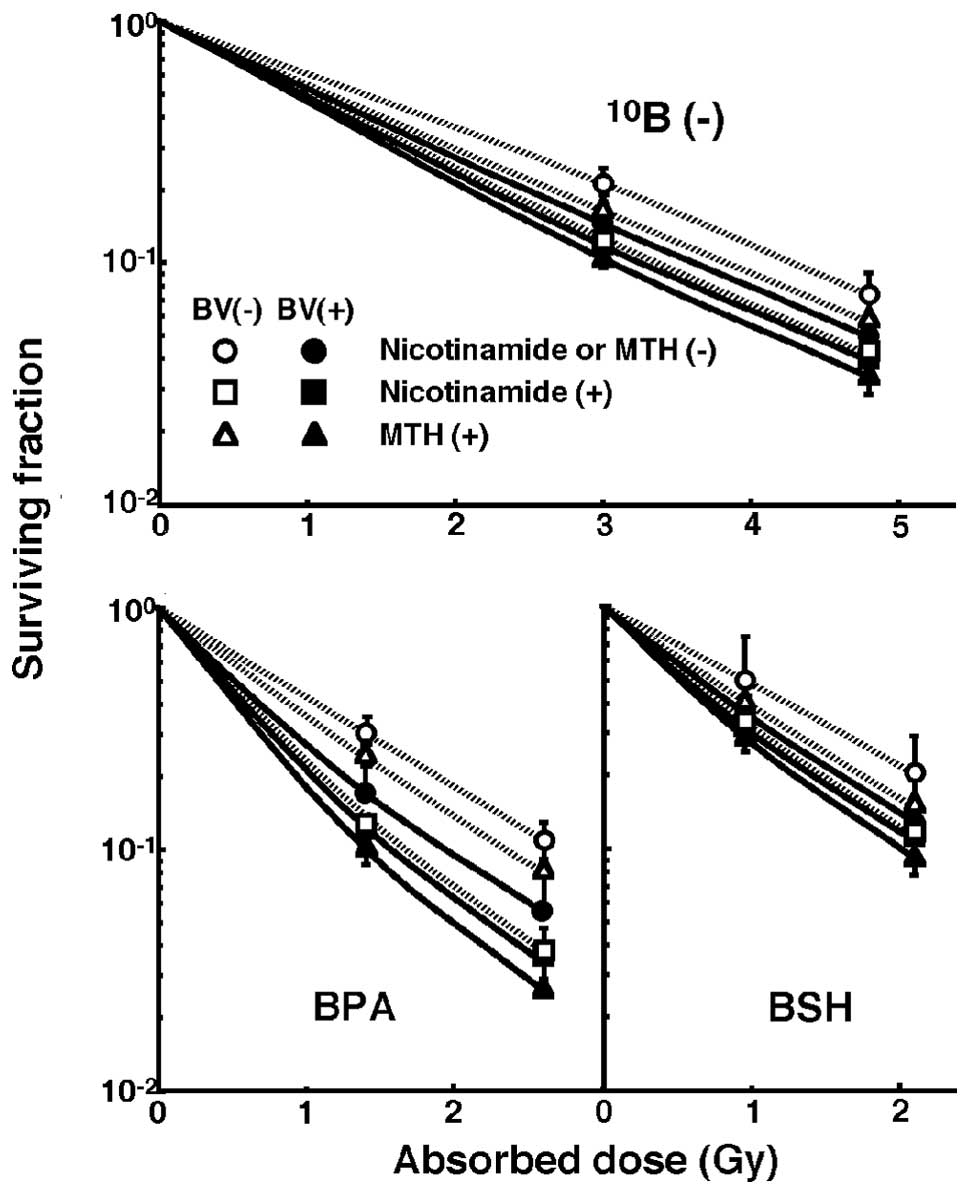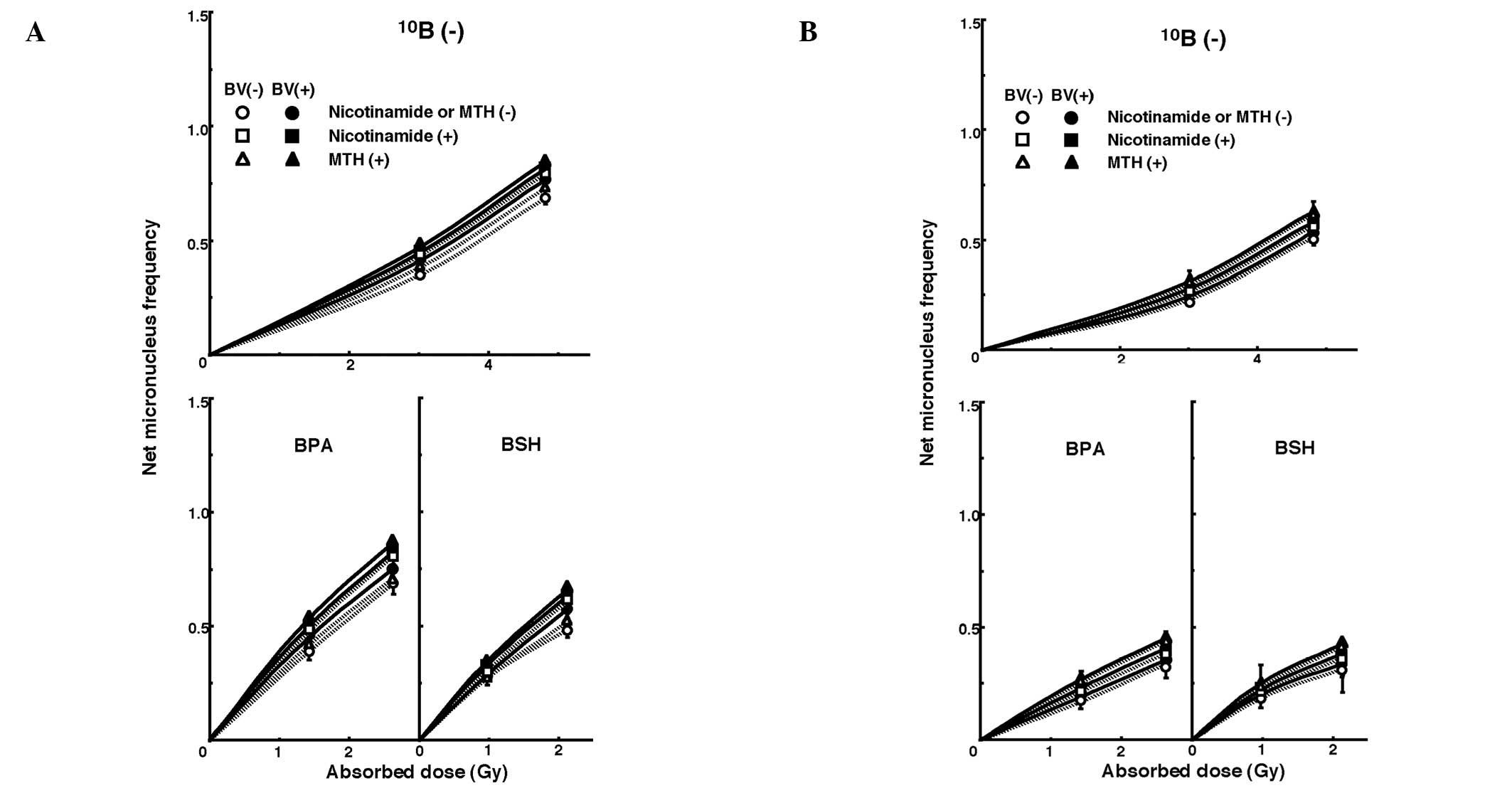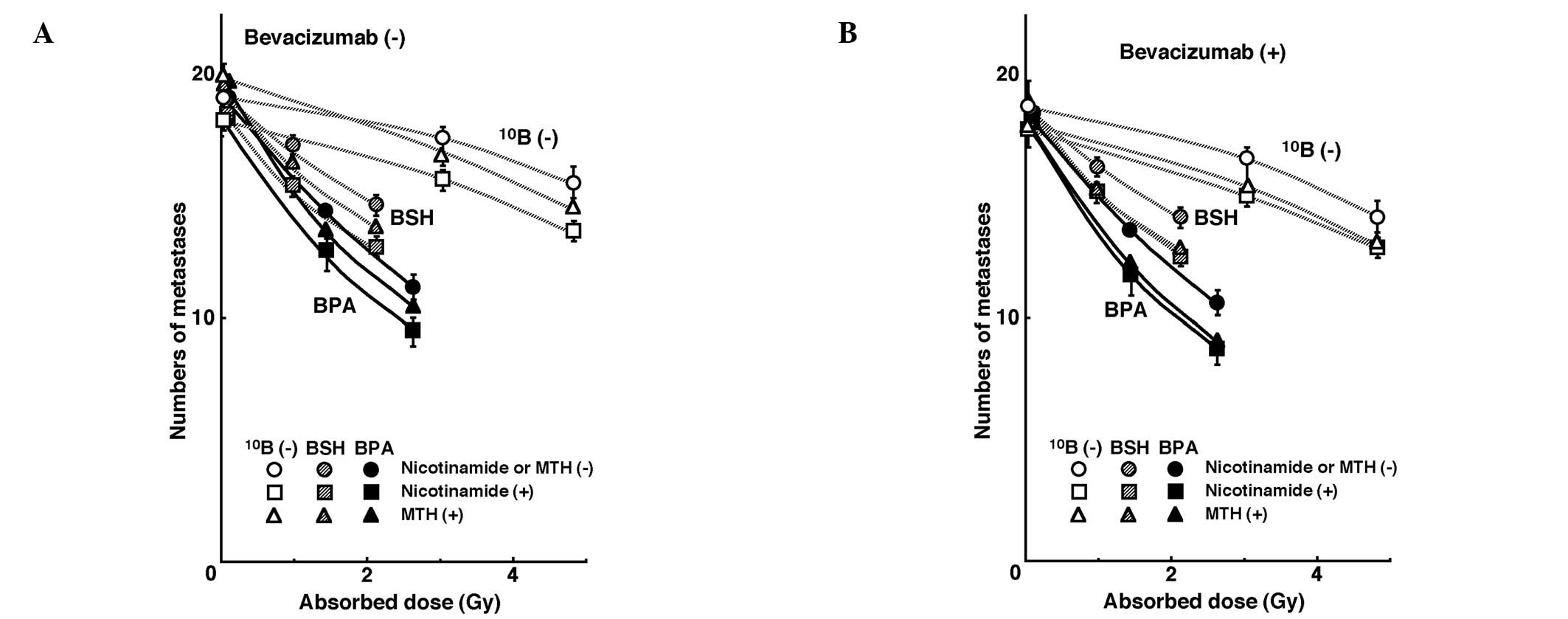|
1
|
Barth RF, Coderre JA, Vicente MG and Blue
TE: Boron neutron capture therapy of cancer: current status and
future prospects. Clin Cancer Res. 11:3987–4002. 2005. View Article : Google Scholar : PubMed/NCBI
|
|
2
|
Soloway AH, Hatanaka H and Davis MA:
Penetration of brain and brain tumor. VII Tumor-binding sulfhydryl
boron compounds. J Med Chem. 10:714–717. 1967. View Article : Google Scholar : PubMed/NCBI
|
|
3
|
Coderre JA, Turcotte JC, Riley KJ, Binns
PJ, Harling OK and Kiger WS III: Boron neutron capture therapy:
cellular targeting of high linear energy transfer radiation.
Technol Cancer Res Treat. 2:355–375. 2003. View Article : Google Scholar : PubMed/NCBI
|
|
4
|
Wittig A, Sauerwein WA and Coderre JA:
Mechanisms of transport of p-borono-phenylalanine through the cell
membrane in vitro. Radiat Res. 153:173–180. 2000. View Article : Google Scholar : PubMed/NCBI
|
|
5
|
Miyatake S, Kawabata S, Kajimoto Y, et al:
Modified boron neutron capture therapy for malignant gliomas
performed using epithermal neutron and two boron compounds with
different accumulation mechanisms: an efficacy study based on
findings on neuroimages. J Neurosurg. 103:1000–1009. 2005.
View Article : Google Scholar
|
|
6
|
Jain RK: Normalization of tumor
vasculature: an emerging concept in antiangiogenic therapy.
Science. 307:58–62. 2005. View Article : Google Scholar : PubMed/NCBI
|
|
7
|
Winkler F, Kozin SV, Tong RT, et al:
Kinetics of vascular normalization by VEGFR2 blockade governs brain
tumor response to radiation: role of oxygenation, angiopoietin-1,
and matix metalloproteinases. Cancer Cell. 6:553–563. 2004.
|
|
8
|
Brown JM: Evidence for acutely hypoxic
cells in mouse tumours, and a possible mechanism of reoxygenation.
Br J Radiol. 52:650–656. 1979. View Article : Google Scholar : PubMed/NCBI
|
|
9
|
Cairns BA, Kalliomaki T and Hill RP: Acute
(cyclic) hypoxia enhances spontaneous metastasis of KHT murine
tumors. Cancer Res. 61:8903–8908. 2001.PubMed/NCBI
|
|
10
|
Rofstad EK, Galappathi K, Mathiesen B and
Ruud EB: Fluctuating and diffusion-limited hypoxia in
hypoxia-induced metastasis. Clin Cancer Res. 13:1971–1978. 2007.
View Article : Google Scholar : PubMed/NCBI
|
|
11
|
Masunaga S, Ono K, Suzuki M, et al:
Alteration in the hypoxic fraction of quiescent cell populations by
hyperthermia at mild temperatures. Int J Hyperthermia. 13:401–411.
1997. View Article : Google Scholar : PubMed/NCBI
|
|
12
|
Masunaga S, Matsumoto Y, Hirayama R, et
al: Significance of manipulating intratumor hypoxia in the effect
on lung metastases in radiotherapy, with reference to its effect on
the sensitivity of intratumor quiescent cells. Clin Exp Metastasis.
26:693–700. 2009. View Article : Google Scholar : PubMed/NCBI
|
|
13
|
Masunaga S and Ono K: Significance of the
response of quiescent cell populations within solid tumors in
cancer therapy. J Radiat Res. 43:11–25. 2002. View Article : Google Scholar : PubMed/NCBI
|
|
14
|
Duan X, Zhang H, Liu B, Li XD, Gao QX and
Wu ZH: Apoptosis of murine melanoma cells induced by heavy-ion
radiation combined with Tp53 gene transfer. Int J Radiat Biol.
84:211–217. 2008. View Article : Google Scholar : PubMed/NCBI
|
|
15
|
Dings RP, Loren M, Heun H, et al:
Scheduling of radiation with angiogenesis inhibitors anginex and
Avastin improves therapeutic outcome via vessel normalization. Clin
Cancer Res. 13:3395–3402. 2007. View Article : Google Scholar : PubMed/NCBI
|
|
16
|
Masunaga S, Ono K, Sakurai Y, et al:
Evaluation of apoptosis and micronucleation induced by reactor
neutron beams with two different cadmium ratios in total and
quiescent cell populations within solid tumors. Int J Radiat Oncol
Biol Phys. 51:828–839. 2001. View Article : Google Scholar
|
|
17
|
Kobayashi T and Kanda K: Microanalysis
system of ppm-order B-10 concentrations in tissue for neutron
capture therapy by prompt γ-ray spectrometry. Nucl Instrum Methods
Phys Res. 204:525–531. 1983.
|
|
18
|
Nishimura Y, Ono K, Hiraoka M, et al:
Treatment of murine SCC VII tumors with localized hyperthermia and
temperature-sensitive liposomes containing cisplatin. Radiat Res.
122:161–167. 1990. View Article : Google Scholar : PubMed/NCBI
|
|
19
|
Sakurai Y and Kobayashi T: Characteristics
of the KUR heavy water neutron irradiation facility as a neutron
irradiation field with variable energy spectra. Nucl Instr Meth A.
453:569–596. 2000. View Article : Google Scholar
|
|
20
|
Kobayashi T, Sakurai Y, Kanda K, Fujita Y
and Ono K: The remodeling and basic characteristics of the heavy
water neutron irradiation facility of the Kyoto University Research
Reactor, mainly for neutron capture therapy. Nucl Tech.
131:354–378. 2000.
|
|
21
|
Snyder WS, Cook MJ, Nasset ES, Karhausen
LR, Parry Howells G and Tipton I: Gross and elemental content of
reference man. Report of the task group on reference man. Snyder
WS: Pergamon Press; Oxford, UK: pp. 273–324. 1975
|
|
22
|
De Jaeger K, Kavanagh MC and Hill RP:
Relationship of hypoxia to metastatic ability in rodent tumours. Br
J Cancer. 84:1280–1285. 2001.PubMed/NCBI
|
|
23
|
Hall EJ: Time, Dose, and Fractionation in
Radiotherapy. Radiobiology for the Radiologist. Hall EJ and Giaccia
AJ: 7th edition. Lippincott Williams & Wilkins; Philadelphia,
PA, USA: pp. 391–411. 2012
|
|
24
|
Vaupel P: Tumor microenvironmental
physiology and its implications for radiation oncology. Semin
Radiat Oncol. 14:198–206. 2004. View Article : Google Scholar : PubMed/NCBI
|
|
25
|
Vaupel P, Kallinowski F and Okunieff P:
Blood flow, oxygen and nutrient supply, and metabolic
microenvironment of human tumors: a review. Cancer Res.
49:6449–6465. 1989.PubMed/NCBI
|
|
26
|
Chaplin DJ, Horsman MR and Trotter MJ:
Effect of nicotinamide on the microregional heterogeneity of oxygen
delivery within a murine tumor. J Natl Cancer Inst. 82:672–676.
1990. View Article : Google Scholar : PubMed/NCBI
|
|
27
|
Song CW, Park H and Griffin RJ:
Improvement of tumor oxygenation by mild hyperthermia. Radiat Res.
155:512–528. 2001.PubMed/NCBI
|
|
28
|
Presta LG, Chen H, O’Conner SJ, et al:
Humanization of an anti-vascular endothelial growth factor
monoclonal antibody for the therapy of solid tumors and other
disorders. Cancer Res. 57:4593–4599. 1997.PubMed/NCBI
|
|
29
|
Ma J and Waxman DJ: Combination of
antiangiogenesis with chemotherapy for more effective cancer
treatment. Mol Cancer Ther. 7:3670–3684. 2008. View Article : Google Scholar : PubMed/NCBI
|
|
30
|
Jain RK, Tong RT and Munn LL: Effect of
vascular normalization by antiangiogenic therapy on interstitial
hypertension, peritumor edema, and lymphatic metastasis: insights
from a mathematical model. Cancer Res. 67:2729–2735. 2007.
View Article : Google Scholar
|
|
31
|
Molinari AJ, Pozzi EC, Monti Hughes A, et
al: Tumor blood vessel “normalization” improves the therapeutic
efficacy of boron neutron capture therapy (BNCT) in experimental
oral cancer. Radiat Res. 177:59–68. 2012.
|
|
32
|
Ando K, Koike S, Ohira C, et al:
Accelerated reoxygenation of a murine fibrosarcoma after carbon-ion
radiation. Int J Radiat Biol. 75:505–512. 1999. View Article : Google Scholar : PubMed/NCBI
|
|
33
|
Möller MG, Lewis JM, Dessureault S and
Zager JS: Toxicities associated with hyperthermic isolated limb
perfusion and isolated limb infusion in the treatment of melanoma
and sarcoma. Int J Hyperthermia. 24:275–89. 2008.PubMed/NCBI
|

















